Why I am stuck using Dropbox?
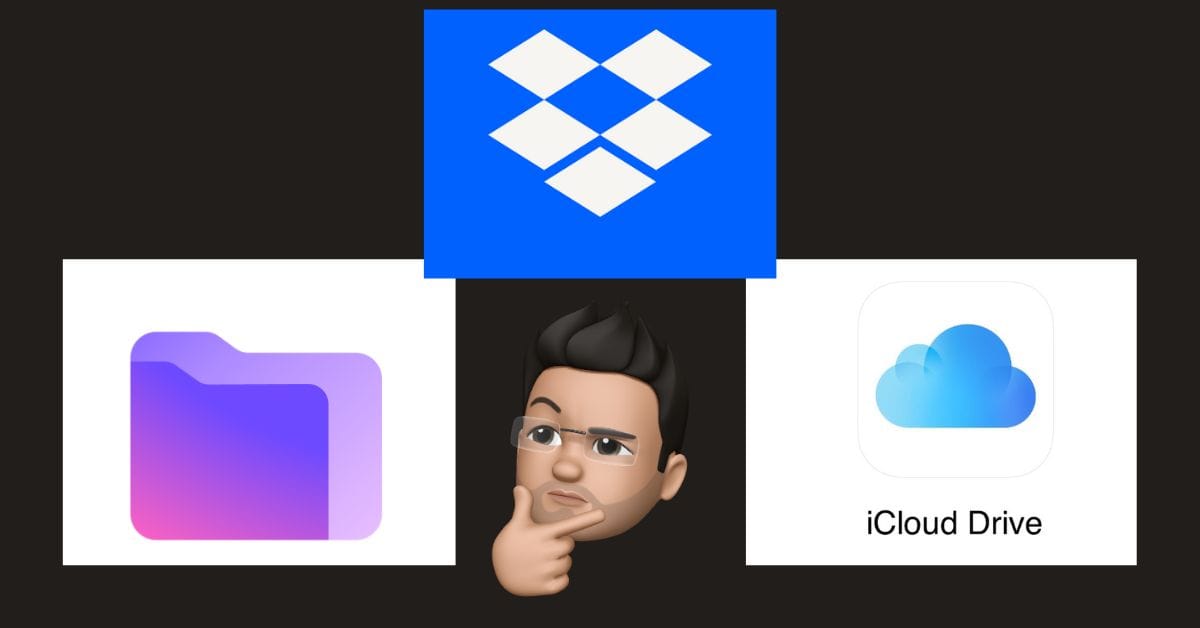
The Alternatives Considered
I have spent the last fortnight exploring, moving away from Dropbox. The three main options were:
- iCloud Drive: supports end-to-end encryption but is not multi-platform (although, interestingly, works on Windows). iCloud Drive does not work at all with third party services, etc. The iCloud Drive folder is also the same place where all the third-party apps store their files. Therefore, it's not the clean folder experience compared to Dropbox:
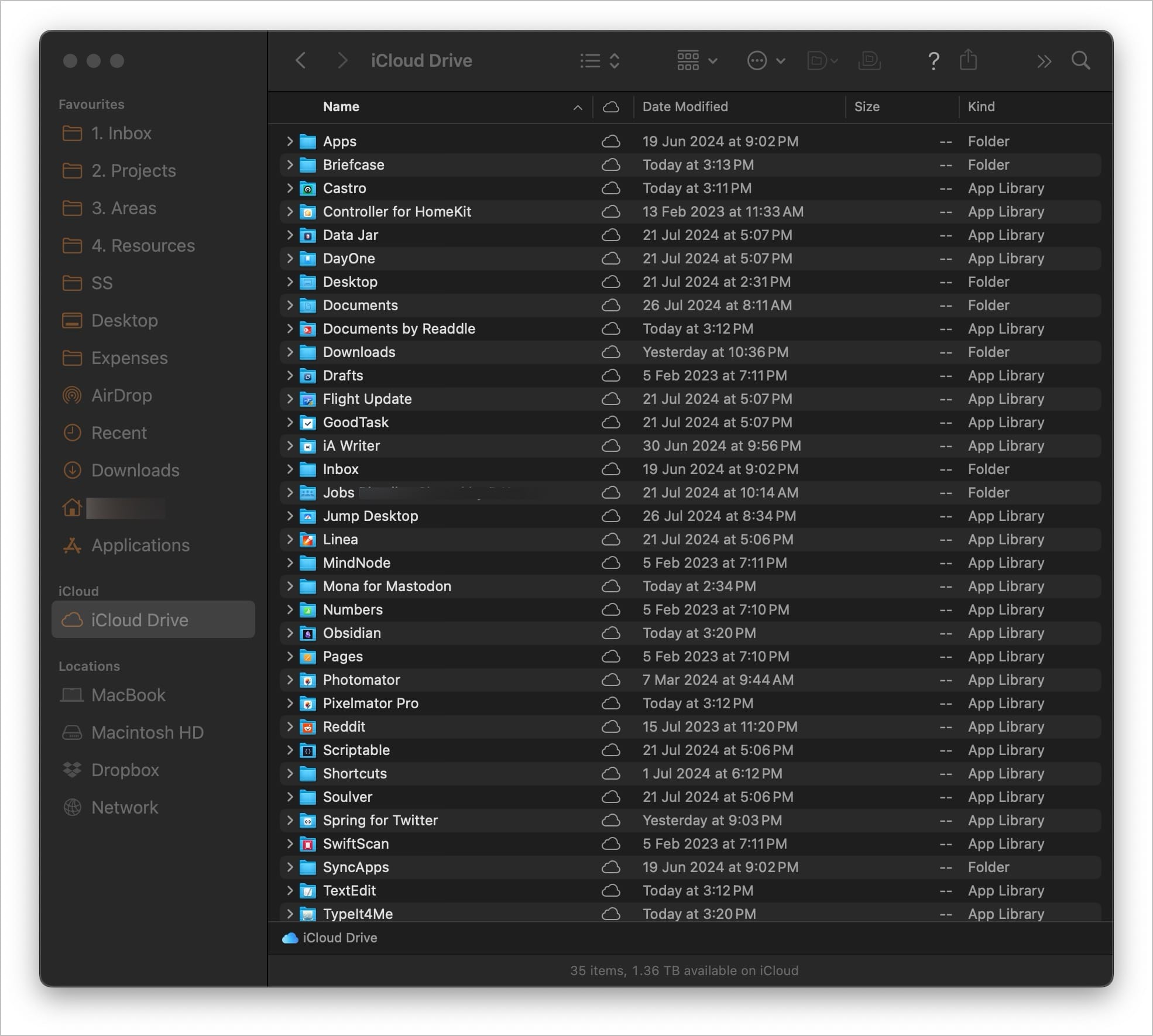
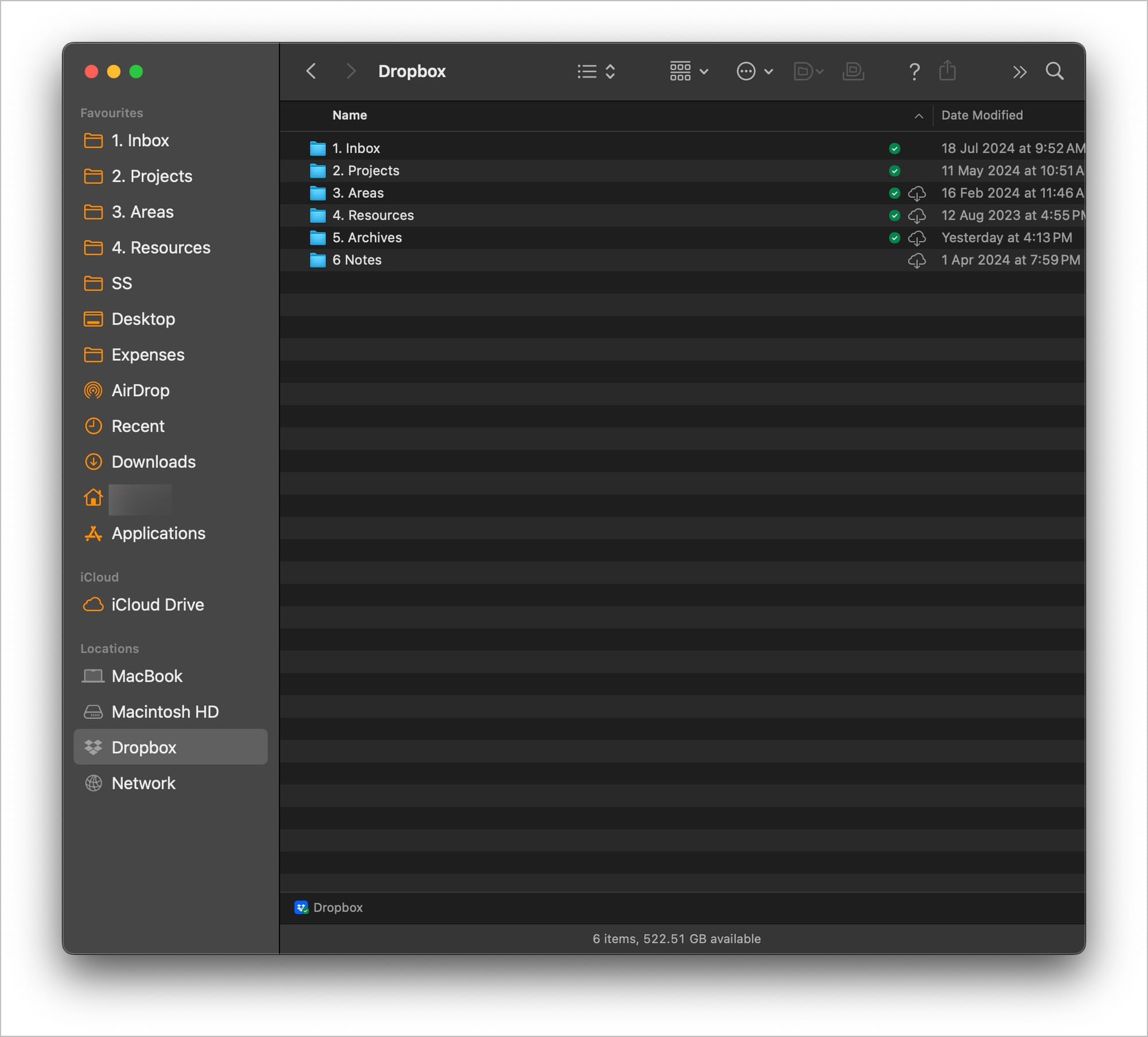
Finder: iCloud on the left and Dropbox on the right
- Proton Drive: supports end-to-end encryption and is multi-platform. But it still needs plenty of time in the oven:

- Synology Drive: considered using my very own NAS for my sync service. Positive reviews on Reddit and appear to work well. It offers two options: one way sync from mac to NAS (good backup option) and the other is Dropbox like folder where it syncs anything in that folder with all the devices. The biggest benefit is that you can host it yourself. The transfer speeds within your local network are incredible. Downside being, you handle its management and maintenance.
Why I feel that I need to move away from Dropbox?
Suddenly, it occurred to me that perhaps I should evaluate why I am not keen to continue using Dropbox. Sometimes, we overthink things and writing helps paint a clear picture of the situation.
Despite having the mindset that I am begrudgingly using Dropbox as my file sync service, I could only come up with one reason 😔:
- Dropbox does not support end-to-end encryption (except for business accounts)
I was annoyed with myself initially. I spent a lot of time exploring alternatives without fully understanding the problem. There are other minor reasons:
- The Dropbox Mac app is resources intensive, but this isn't a problem for me because my M1 Pro Max MacBook Pro is more than capable. I have yet to notice any slowdowns, so this is an issue that does not affect my use case.
- Costs: Obviously, I rather not pay another subscription but considering the benefits Dropbox provides, I am comfortable paying for a sync service not owned by Big Tech. All alternatives I am considering cost money as well.
- Dropbox "make folder available offline" (especially folders with many files has never worked for me on my mobile devices (iOS and Android). Then again, I have yet to find any sync service able to keep a folder in sync and available offline on mobile devices.
Why I started using Dropbox in the first place?
Until last year, I was using iCloud drive and only moved because of reliability concerns which are outlined here.
I moved to Dropbox and the reason for staying with Dropbox is:
- Multi-platform (works on Android, iOS, iPadOS and macOS)
- Undoubtedly, the best file sync service: known for its reliability and speed.
- Integration with Scansnap scanners: I created a 2nd Dropbox account which I connected with Scansnap. The folder in which the scans are saved is than shared with my main Dropbox account. I prefer not to share my entire Dropbox account with ScanSnap.
- Dropbox Search is impressive: most services can search for files by name. However, Dropbox Search can search within file's contents, image contents and also does OCR of PDF files. This means, I can search for anything either on the Dropbox app or on the Dropbox website. This is a highly underrated feature. Interesting, iCloud Drive does not even have a way of searching for files on iCloud.com and Proton Drive
- Dropbox scanner: scan to Dropbox directly from the app. The Files app on iOS and the camera app on Android also does this, but the quality of the scan is better on Dropbox and the file sizes are also much smaller.
- Dropbox API: many apps have direct secure connection with Dropbox. For my use case, I use the direct Dropbox connection with the Documents app (to have the entire Dropbox folder available offline) on iOS, Transmit app on macOS and FolderSync (to have the entire Dropbox folder available offline) app on Android.
- Backing up my Dropbox: Synology has an app called CloudSync which can regularly (automatically) backup my entire Dropbox folder to my Synology NAS. I can back up by iCloud folder to my NAS by using SynologyDrive app on my MacBook (this is a way one sync) and it works well but requires the MacBook to be always on.
- Backing up other folders to Dropbox is also an underrated feature. Currently, I am using it to back up other folders on my Mac to Dropbox. This includes many folders on iCloud Drive. I have also used this feature to back up my Desktop, Downloads and Documents folder to Dropbox. This kind of replicates the iCloud Documents and Desktop sync feature. Sadly, these backups are only accessible on the web and not on Dropbox's mobile apps.
- Clean web experience: admittedly not used often but occasionally it comes in handy and I appreciate the clean web experience.
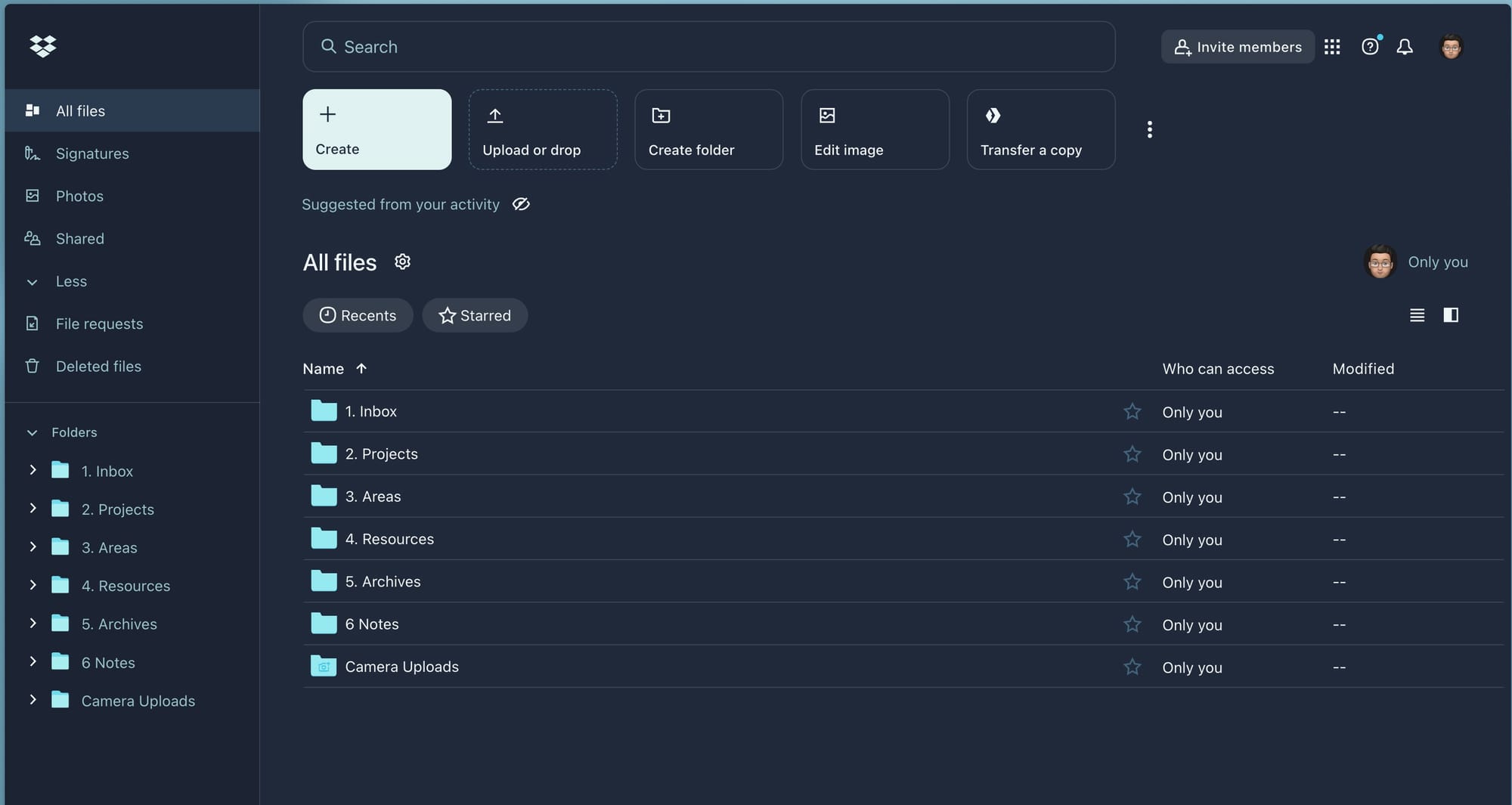
- Version history: Dropbox gives users 180 days to restore files. Incredibly handy, and I have found versions of files months ago that I needed.
- LAN Sync: as far as I know, this feature is exclusive to Dropbox. It essentially allows two computers to sync Dropbox using LAN instead of Dropbox cloud. I only have one computer at the moment, so I have yet to take advantage of this feature.
What about iCloud Drive?
iCloud Drive is a strong competitor. Many of the features I like on Dropbox could be implemented differently with an always-on Mac. Currently, I don't have one, but this might change soon. Assuming I did:
- The scanner could save directly to a folder on my Mac using the Scansnap Home app on my mac
- Arq Backup to run backups in the background to my NAS or any other cloud storage, also can have version history feature.
- Alternative for Dropbox search is DevonThink or PDF Search. Neither works as seamless and works on every platform as Dropbox Search.
The subjective benefit is the feeling of not being trapped in the Apple ecosystem. However, files are easy to move, so I wouldn't consider this a lock-in. If I am being honest with myself, if multi-platform was not a requirement, I would probably use iCloud Drive.
The most annoying part of iCloud Drive is the lack of options for the end user. It seems to do everything behind the scenes and users are supposed to accept it. The user has very few options, or sometimes none. This is fine when things are going smoothly, but as soon as a problem arises, the user becomes confused and unsure of what to do.
End-to-End Encryption: What's the big deal?
I prefer end-to-end encryption because it appeals to me conceptually, even though I don't have a specific practical reason for needing it.
I started using Dropbox around 2008 and until a few years ago; I wasn't even aware that Dropbox did not support end-to-end encryption. Until a few years, none of the major players did. Most of them still do not (Google Drive, Microsoft's OneDrive, Box, Dropbox). Apple is the only one that does this, and it was only launched last year.

Today, Apple's services such are email, contacts, calendar still do not support end-to-end encryption. If I want everything to be end to end encrypted, I should go all into the Proton Ecosystem.
However, there are tradeoffs to implementing end-to-end encryption. Neither Apple nor Proton has APIs that third party can access. If Dropbox does not have access to my files, features like Dropbox Search will not exist (assumption on my part). This is because, to search for contents in my PDFs and images, Dropbox needs to index my files and it cannot do that if it does not have the keys to access the encrypted files.
Therefore, because Proton Drive is end to end encrypted, searching on drive.proton.me is a mediocre experience because before even conducting a search, wait for the browser to index the files. However, if you require true end-to-end encryption, you are more than willing to live with these inconveniences. In the end, individuals are responsible for finding their own balance between convenience and security/privacy.
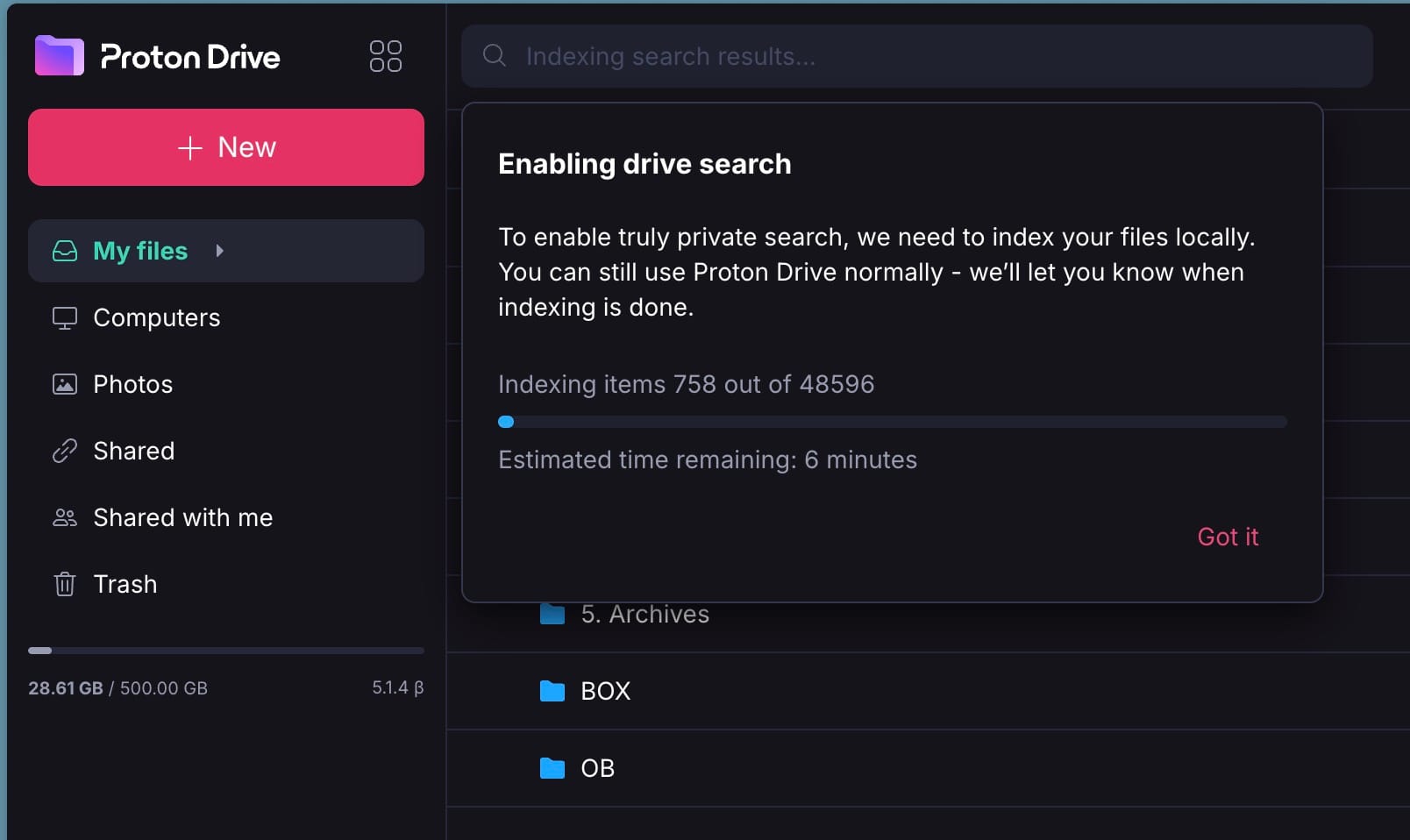
However, iCloud Drive is even worse. It does not have any way to search for files on iCloud.com.
Concluding thoughts:
Things are pretty clear in my mind now. If I can make peace with the lack of end-to-end encryption (which I can because I have been living most of my life without end-to-end encryption and I do not have a practical need for this feature), Dropbox remains the best file sync service for my use case.
Considering the benefits and the peace of mind Dropbox provides, currently, I am happy with the tradeoff of not having end-to-end encryption.
